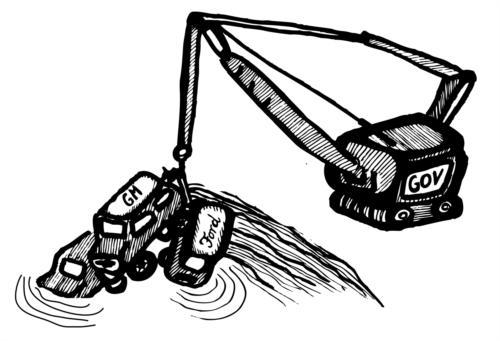Conventional economic wisdom holds that the free market alone should determine which companies and industries succeed and fail. A company’s decisions, whether they are wise or poor, are its own to make, and it should have to face consequences of those decisions. The American auto industry giants—namely, General Motors, Ford, and Chrysler—have made a number of poor, if not self-destructive, choices in the past decade, culminating in their current liquidity crisis. While a healthy economy would survive the bankruptcy of a Big Three auto giant, any such failure could plunge the economy as a whole into depression in the current economic environment. In order to prevent this from happening, Congress needs to extend a loan to these companies.
The automakers should certainly be held responsible for their own poor choices. Their focus on the production of SUVs and trucks instead of more fuel-efficient cars has caused major profit losses, as consumers have turned away from these gas-guzzling vehicles. Union support for these strategies—while politically helpful to their constituents in the short term—has also made it difficult for Congress to impose fuel standards on the industry. Wherever the blame lies, however, making the changeover to producing more fuel-efficient vehicles will require a huge amount of capital, without which the automakers are likely to face bankruptcy.
The bankruptcy of any of these companies, however, would likely throw the already recessing economy into a depression. If the American auto industry were to fail, the job losses for autoworkers and the consequences for other industries would be catastrophic: It is estimated that the collapse of General Motors, which is the closest of the Big Three to bankruptcy, would result in 2.5 million jobs losses, not only among GM employees, but also among parts suppliers, some of which would also fail. Given the centrality of the auto industry to the American economy, its failure could have unpredictable and wide-ranging repercussions.
Rather than letting the auto companies fall victim to the free market, Congress needs to intervene by providing the capital they need to improve the industry in the long run. However, Congress should not simply hand over a loan without ensuring that it will be used responsibly. With the auto industry in such a weak bargaining position, Congress has a unique opportunity to push forward its goal of decreasing American oil consumption. Tying the loan to higher fuel standards will help decrease national fuel consumption and dependence on foreign oil. In addition, forcing the auto companies to make more fuel-efficient cars will help them compete in the long-term against foreign automakers that are currently selling hybrid cars, which are more attractive to consumers in light of rising gas prices.
In a more punitive vein, Congress could also consider requiring these companies to replace the management that has driven their companies into the current crisis. Making management accountable for its mistakes will likely discourage those who think that a congressional bailout provides a convenient out for failing companies.
It may not be the government’s job to protect individual companies from failing, but in economic crises, it should work to lessen the effects of recession. Because of the central role the auto industry plays in the economy, Congress needs to both prevent the automakers from collapsing and hold them accountable for their past actions. It should use its position of power over the auto companies to make them adopt responsible long-term strategies. With the economy on a crash course, a bailout may be the best way to lessen the impact.
Read more in Opinion
Five Reasons for Reason and Faith













